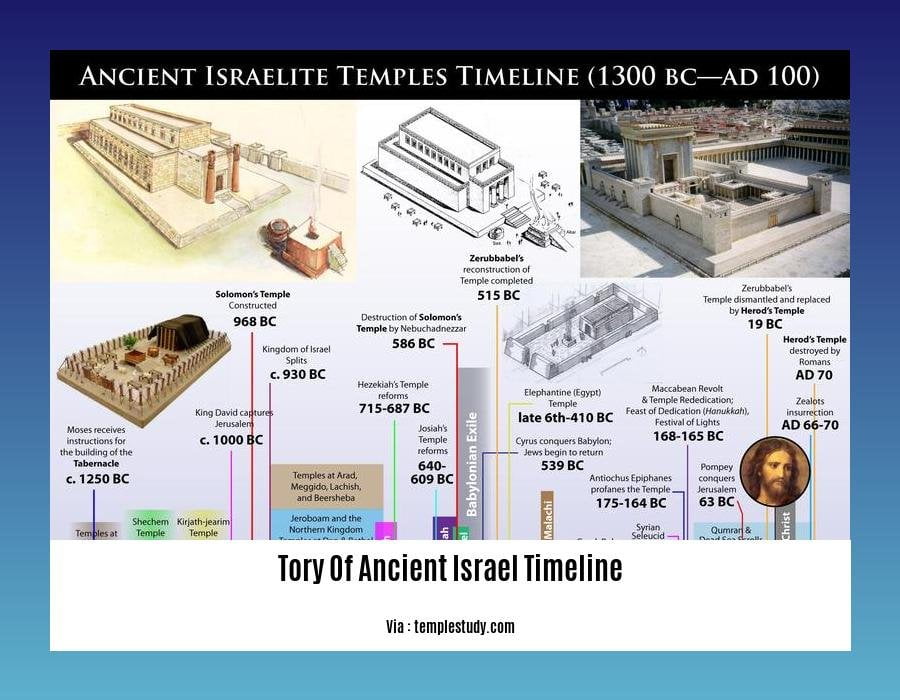Step back in time and explore the intriguing journey of ancient Israel, from its humble beginnings to its eventual decline. This ancient civilization left a lasting impression on our world, shaping religious thought, cultural practices, and historical narratives for centuries to come. Discover the stories and secrets that unfold throughout this captivating history.
History of Ancient Israel Timeline
The story of ancient Israel begins in the Levant region around the 13th century BCE. Their journey starts with a daring escape from slavery in Egypt, known as the Exodus, led by the prophet Moses. The Israelites embarked on a journey to the Promised Land of Canaan, guided by their faith.
Once settled, the Israelites were guided by wise leaders known as Judges. These figures resolved disputes and provided wisdom during a time of growth and development. As their society evolved, a desire for a more unified rule led to the establishment of a monarchy.
The reigns of King David and his son, King Solomon, marked a golden age for Israel. David, a skilled warrior, united the northern and southern tribes, solidifying their kingdom. Solomon, renowned for his wisdom and diplomacy, oversaw the construction of the grand Temple in Jerusalem. This magnificent structure became the heart and soul of their religious and cultural life.
However, internal strife eventually led to the kingdom splitting in two: Israel in the north and Judah in the south. This division weakened them, making them vulnerable to outside forces. The Assyrians conquered Israel in the 8th century BCE, followed by the Babylonians who overtook Judah and destroyed the Temple in 586 BCE.
Even in exile, the spirit of the Israelites remained unbroken. They returned to their homeland after several decades and rebuilt their beloved Temple, ushering in the Second Temple period. This era witnessed the flourishing of Jewish culture and religious thought, laying the groundwork for the development of Judaism as we know it today.
If you want a more in-depth look at the events that shaped the ancient Israelites, be sure to explore our detailed History of Ancient Israel Timeline.
Timeline of Key Events:
| Century BCE | Event |
|---|---|
| 13th | Israelites, under Joshua’s leadership, establish a presence in Canaan |
| 12th | The era of Judges, providing guidance and leadership |
| 11th | King Saul rises to power, marking the beginning of the monarchy |
| 10th | The reigns of David and Solomon usher in a golden age for Israel |
| 10th (specifically 970-931) | King Solomon commissions the construction of the grand Temple in Jerusalem |
| 8th | The kingdom divides into Israel (north) and Judah (south) |
| 8th | The Assyrians conquer the northern kingdom of Israel |
| 6th (specifically 586) | The Babylonians conquer the southern kingdom of Judah, destroying the Temple |
| 6th | The Israelites return from exile in Babylon |
| 6th-1st | The Second Temple period, a time of cultural and religious revitalization |
Key Points of Ancient Israel’s History:
- 13th Century BCE: Israelites establish a presence in Canaan under Joshua’s leadership.
- 12th Century BCE: Era of Judges provides guidance and leadership.
- 11th Century BCE: King Saul begins the monarchy.
- 10th Century BCE: Reigns of David and Solomon usher in a golden age.
- 970-931 BCE: King Solomon commissions the Temple in Jerusalem.
- 8th Century BCE: Kingdom divides into Israel (north) and Judah (south).
- 8th Century BCE: Assyrians conquer Israel.
- 586 BCE: Babylonians conquer Judah and destroy the Temple.
- 6th Century BCE: Israelites return from exile in Babylon.
- 6th-1st Centuries BCE: Second Temple period marked by cultural and religious revitalization.
- Dive into the evolution of education from ancient times to the present day and explore how teaching methods and philosophies have transformed over the centuries.
- Delve into the contrasts between ancient and modern education systems, uncovering the stark differences in curriculum, pedagogy, and the overall approach to learning.
- Unravel the changes in the Olympics from its inception in ancient Greece to its modern iteration, witnessing how the games have evolved over time.
- Discover the renowned ancient Greek playwrights who crafted iconic theatrical masterpieces, leaving an enduring legacy in the world of drama and literature.

From Patriarchs to Kings: The Rise of a Nation
Long before the establishment of a kingdom, the story of ancient Israel began with the Patriarchs – Abraham, Isaac, and Jacob. Their lives, as told in the book of Genesis, laid the foundation upon which the grand saga of Israel was built. These stories, passed down for generations, became the bedrock of Israelite identity, explaining their origins, their special connection to God, and their claim to the land of Canaan.
The Patriarchal Age, as it’s known, provides a glimpse into a time when nations were families and their stories intertwined with faith and divine encounters. While historians continue to debate the historical accuracy of every detail, the impact of these narratives is undeniable.
Life as wandering shepherds eventually gave way to a yearning for unity and stability. This desire ushered in the period of the Judges – charismatic leaders who rose to guide the Israelites through conflict and uncertainty. Yet, it was under the reign of King David, a shepherd-turned-warrior-king, that Israel truly transformed. His rule marked a turning point, uniting the twelve tribes under a single banner and establishing a golden age.
Key Lines:
- The Patriarchal Age (c. 2166-1660 BC) marks the era of Abraham, Isaac, and Jacob, the founding fathers of the Israelites.
- The stories of the Patriarchs, recorded in Genesis 12-50, narrate their journeys, divine encounters, and the establishment of the 12 Jewish tribes.
- Although the historicity of the Patriarchs remains debated, their significant influence on biblical and cultural narratives cannot be overlooked.
- The transition from the Patriarchal Age to the United Monarchy under King David represents a pivotal turning point in the political and spiritual development of ancient Israel.
Turbulent Times: Conquests and Exiles
The Iron Age was a time of iron swords and chariots, where kingdoms rose and fell like the tides. For ancient Israel, this period was full of drama, upheaval, and resilience. Two kingdoms, Israel in the north and Judah in the south, found themselves constantly vying for power, their story intertwined with the mighty empires of Assyria and Babylonia.
The Assyrians, known for their military might, conquered the Kingdom of Israel in 722 BCE, forcing many of its people into exile. Years later, the Babylonians conquered Judah in 586 BCE, leaving Jerusalem in ruins and sending its people into exile as well.
Exile was a defining experience for the Hebrew people. Scattered across Mesopotamia and beyond, they clung to their traditions and their language, keeping their identity alive even in a foreign land. Generations later, under the rule of the Persian Empire, they were finally granted permission to return and rebuild their homeland.
Archaeologists have unearthed ancient cities, temples, and everyday objects that whisper stories of what life was like during these turbulent times. The Hebrew Bible also chronicles the historical events and delves into the religious beliefs that sustained the people through these trials.
Key Lines:
- Historical & Biblical Israel’s complex history spans centuries, from Abraham’s arrival in Canaan to its domination by various empires.
- The Iron Age saw the rise and fall of the kingdoms of Israel and Judah, marked by conquests, exiles, and turbulent political events.
- Extensive archaeological and textual evidence, including the Hebrew Bible, provides valuable insights into the history and traditions of ancient Israel.
- Studying the archives and history of ancient Israel sheds light on religious, social, and cultural developments that have shaped contemporary Jewish and Christian thought.
The Enduring Legacy of Ancient Israel
The story of ancient Israel begins with a group of nomads wandering a land called Canaan. Around the 13th century BCE, these wanderers settled down, putting down roots that would blossom into the nation of Israel. Their story, as told in the Bible, speaks of hardship and resilience.
Enslaved in Egypt, they found a leader in Moses, who led them on a courageous exodus to reclaim their freedom. This journey wasn’t just about escaping oppression; it was about forging a unique identity, solidifying a covenant with their God, and ultimately establishing a united kingdom under the reign of King David.
The period under David and his son Solomon was a golden age for ancient Israel, marked by prosperity and cultural achievement. The crowning glory of this era was the construction of the magnificent Temple in Jerusalem, a symbol of their devotion and a testament to their architectural prowess.
However, even golden ages fade. After Solomon’s death, internal strife fractured the kingdom, splitting it into two: Israel in the north and Judah in the south. This division left them vulnerable to the looming shadows of powerful empires.
The 8th and 6th centuries BCE brought the conquests of the Assyrians and Babylonians, respectively. These events led to the destruction of the Temple and the scattering of the Israelites into exile. Yet, even in exile, their spirit remained unbroken.
Decades later, led by Cyrus the Great, they returned to their beloved land and rebuilt the Temple. This period, known as the Second Temple era, saw a resurgence of Jewish thought and tradition. It was a spiritual awakening that would profoundly impact the world.
Ancient Israel’s story is our story. It’s a story of resilience in the face of adversity, of faith tested and renewed, of the enduring power of culture and belief. Their legacy echoes in the foundation of Western civilization, in the birth of major religions, and in the timeless principles of justice, morality, and hope that continue to inspire us today.
Key Lines:
- Ancient Israel originated in the 13th-12th century BCE, tracing its roots to the nomadic patriarch Abraham.
- The ancestral records of the Israelites describe their enslavement in Egypt and subsequent migration to Canaan.
- The history of ancient Israel is predominantly known through the Hebrew Bible/Old Testament, offering a diverse perspective on social, political, and religious aspects.
- Historical evidence, including archaeological discoveries and ancient texts, provides valuable insights into the life, culture, and history of the ancient Israelites.
















